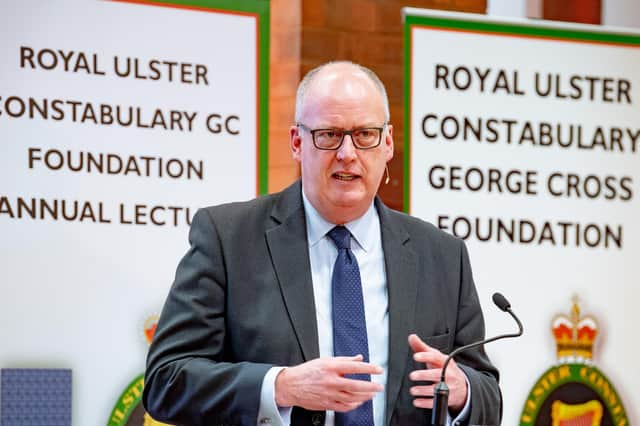Troubles amnesty plans ‘bonkers’ says former PSNI chief constable


Sir George Hamilton, who retired from Northern Ireland’s top policing post in June 2019, said he believes the statute of limitations as suggested will “undermine the rule of law”.
He said it was “quite liberating” to be able to speak freely on legacy issues as a civilian.
Advertisement
Hide AdAdvertisement
Hide AdSir George made his comments after his keynote address at the inaugural RUC GC Foundation lecture at Queen’s University on Thursday night.
In response to a direct question on the Troubles amnesty, that would include former terrorists, he said: “I think it’s bonkers. I just think it’s crazy that we would go there.
“There is something that frightens me a bit, in a liberal democracy, when you undermine the rule of law to that extent, and that is partly what I see it as.
“Not shackled by the office of chief constable I can say a little bit more on that. I have yet to meet one [military veteran], or one police officer, who would want an amnesty.
Advertisement
Hide AdAdvertisement
Hide Ad“They don’t want an amnesty. In fact, if there were people within their ranks who brought disrepute on the regiment, as it was put to me, they would like them held to account.”
Commenting on the wider legacy issuing, including the need for Article 2 compliant investigations into fatal incidents, the former top officer said: “If we are going to approach it, and this is what surprises me about the proposals, I don’t think you deal with it by drawing a line under it.
“It would save lots of resources but actually it would just make this horrible, aching, seething sore continue for generations to come.
“And we do see it being inter-generational. Some of the loudest voices and the strongest advocates on legacy issues are second or third generation people who weren’t even born at the time of the Good Friday Agreement.”
Advertisement
Hide AdAdvertisement
Hide AdDuring his address, Sir George recalled how as a 19-year-old constable in Enniskillen he held a colleague and “dear friend” in his arms “as his life ebbed away” following a litter bin bomb blast in January 1987.
He also recalled how he lost another close friend and colleague at the Poppy Day cenotaph bomb in the town just ten months later.
Sir George’s lecture was entitled ‘Remembering, Respecting, Learning and Progressing’ – a personal and professional analysis of the transition from Royal Ulster Constabulary GC to Police Service of Northern Ireland.
RUC GC Foundation chairman Stephen White said: “This lecture demonstrates the Foundation’s desire to contribute to our society by enhancing people’s understanding of and promoting learning about policing. In commemorating the RUC GC’s record of service and sacrifices, our aim is to be meaningful, outward-looking and fully committed to promoting the rule of law and best practices”.
Advertisement
Hide AdAdvertisement
Hide AdWelcoming Sir George, QUB vice-chancellor Prof Ian Greer said: “We look forward to working with the Foundation in supporting their outreach and community engagement efforts.”
——— ———
A message from the Editor:
Thank you for reading this story on our website. While I have your attention, I also have an important request to make of you.
With the coronavirus lockdowns having had a major impact on many of our advertisers — and consequently the revenue we receive — we are more reliant than ever on you taking out a digital subscription.
Advertisement
Hide AdAdvertisement
Hide AdSubscribe to newsletter.co.uk and enjoy unlimited access to the best Northern Ireland and UK news and information online and on our app. With a digital subscription, you can read more than 5 articles, see fewer ads, enjoy faster load times, and get access to exclusive newsletters and content.
Visit
now to sign up.
Our journalism costs money and we rely on advertising, print and digital revenues to help to support them. By supporting us, we are able to support you in providing trusted, fact-checked content for this website.
Ben Lowry, Editor